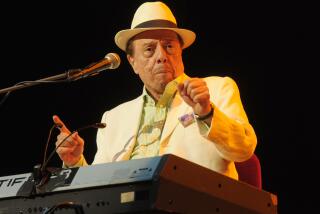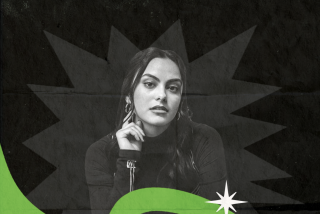STAGE REVIEW : Brazilian Culture Stepping Out in ‘Oba Oba’
- Share via
From the opening moments when comely young Brazilian women step out front and down the aisles of the Pantages Theatre, “Oba Oba” comes right at you.
This musical and dance program designed to bring us the culture of Brazil often runs the risk of looking like a big, dumb Las Vegas extravaganza. Certainly what narrative there is (the script is uncredited) sounds like a cross between a museum docent’s stilted recitatif and a chamber of commerce travelogue. But everywhere the show is redeemed by the native panache of perhaps the most exuberant and outgoing people in the world, and one of the most innately stylish.
“Oba Oba” (an ingenuous title that, roughly translated, means “Oh Boy!” or, if you’re old enough to remember the ‘40s, recalls the ogler’s phrase “Hubba Hubba”), consists of about a dozen production numbers divided by an intermission and framed in an expressively changeable (and also uncredited) Rousseau-esque set.
You can throw out the first and any of the other Tondeleo numbers that try to recapture the mythic and supernatural goings-on of Brazil’s fabled origins, such as the native girl Xica Da Silva’s seduction and overthrow of her Portuguese conqueror, or the Macumba number in Act II (though it’s nicely staged). This is strictly tourist stuff, peremptory and expedient and in no way designed to trick the gods out of hiding or fill us with the foreboding intrigue of real myth.
I wish too that singer Eliana Estevao, who has a showgirl’s dazzling smile, hadn’t been impressed into running down the list of great bossa nova tunes as though her audience had spent the past 25 years on the dark side of the moon. And while we’re quibbling, the show is horrendously overmiked, much to the ruin of the summery loveliness of the Brazilian Portuguese dialect.
All that having been said, the show is a joy. It has its wit (as in a gorgeous sendup of the Carmen Miranda canon) and its class (it makes room for solo Brazilian instruments such as the bandolim, the cavaquinho and the single-stringed berimbau; and the supple men who perform the Capoeira--a combination dance and martial art--give everything they have in what eventually becomes an amazing athletic feat).
One of the things that rescues “Oba Oba” from the freeze-dried glitz of a Vegas showroom pageant is that Brazilians adore spectacle; they’re at home in it. As for the music, it’s nothing for an impromptu parade to stop traffic in Rio any day of the year.
Another is the language, whose softness is filled with the surges of unself-conscious impulsiveness. Brazilian Portuguese is the ultimate romance language.
The theme music for “Oba Oba” sounds like something that could be piped aboard the Love Boat once it touched into the Southern Hemisphere, except that the fullness of its lyrical weight is distinctly Brazilian; the samba is an amazingly strong beat which Brazilians love to load to the max with lengthy melodic lines.
Lastly, “Oba Oba” palpably exudes the good-natured vigor of a people who have no hang-ups over their sensuality. The derrieres and long legs of the women, and the litheness and suppleness of the men here are by no means anomalous; even the average Brazilian boasts a physical attractiveness drawn from the best of African and Western European worlds liberally conjoined. There’s plenty of misery and suffering in Brazil, which the national character blithely resists. As does “Oba Oba,” which is full of the style and grace, humor and opulence of spirit that altogether seems a cultural trait.
But there’s a melancholy wisdom to the flesh at its most vibrant as well; it’s something Brazilians seem to understand better than most of the rest of us, and it may be the unspoken thing that reaches us through “Oba Oba’s” party-time glitter. Or else us North Americans have lost the talent for joy.
Most people dream of going to heaven when they die. Me, I’ll take Brazil.
Performances Tuesdays through Saturdays at 8 p.m., Sundays at 3 and 7 p.m., with Saturday matinees at 2 p.m., at 6233 Hollywood Blvd., (213) 410-1026 and (714) 634-1300. Ends Nov. 20.
More to Read
The biggest entertainment stories
Get our big stories about Hollywood, film, television, music, arts, culture and more right in your inbox as soon as they publish.
You may occasionally receive promotional content from the Los Angeles Times.










